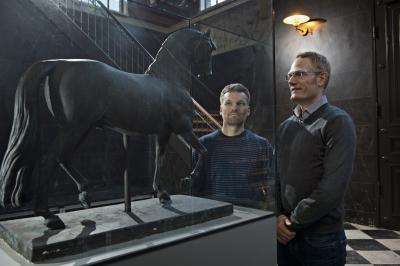Researchers make racehorses fertile

Ten percent of mares have difficulties conceiving. But now two researchers from University of Copenhagen have discovered what the trouble is and have developed a product to help such horses become pregnant. Veterinarians from the world's largest horse hospital in the US state of Kentucky have successfully tested the discovery on 64 breeding mares.
The most common cause of a mare's reduced fertility is a chronic infection in the mucusal membrane of the uterus caused by the bacteria 'Streptococcus equi subspecies zooepidemicus'.
"We noticed that many horses that test negative for streptococci have a dormant infection without showing clinical symptoms. Despite the lack of symptoms, however, it still seems to reduce the fertility of the mares," says Professor Anders Miki Bojesen, from the Department of Veterinary Disease Biology at the University of Copenhagen.
But he and veterinarian PhD Morten Rønn Petersen, who works at the Fertility Department at Copenhagen University Hospital, have found a solution to the problem. From their research, the two managed to activate the sleeping bacteria with an invention that they call Bactivate.
"Once you wake the bacteria you can diagnose the infection and treat the horses with regular antibiotics. Streptococci are usually not resistant to antibiotics, but during dormancy the metabolism is so low that antibiotics are rendered useless. Bactivate is made up of signalling components that rouse the bacteria and lead them to quickly start dividing and multiplying like normal and treatable streptococci," says Anders Miki Bojesen.
Fertility restored
Bactivate was tested at one of the world's largest horse hospitals, Hagyard Equine Medical Institute. The hospital is placed in Lexington, Kentucky, also known as 'the Horse Capital of the World'. The mares that received Bactivate developed substantial but treatable uterus infections.
"We tested on 64 breeding mares at Hagyard that had demonstrated a substantially reduced ability to conceive. Following treatment, 83 percent of the mares got pregnant within one and a half month and 72 percent gave birth to a live foal. This means that fertility levels basically were normalized in mares that previously had not conceived for several cycles, some for years. When dormant streptococci were activated, the mares were treated and bred in the following cycle," Morten Rønn Petersen says.
Hagyard veterinarian Kristina Lu described the discovery as "an important step forward".
"At the end of the day it's an important diagnostic tool because it makes the bacteria grow which means it will definitely play an important role in fertility treatments," she adds.
Facts: Exclusive customers
The high success rate proved so encouraging that the hospital now has taken on the role of selling Bactivate in the US, while the researchers new company, 'Bojesen & Petersen Biotech', will produce it. Bactivate is developed for an exclusive group of customers and will initially be sold to treat some of the world's most valuable thoroughbreds. The best race horses can earn millions of dollars in prize money for their owners who can earn even more by breeding them.
Bactivate needs to be approved by the Danish Medicines Agency before it can be sold in Denmark. Copenhagen Spin-Outs at University of Copenhagen is helping the scientists develop their business.
Provided by University of Copenhagen

















